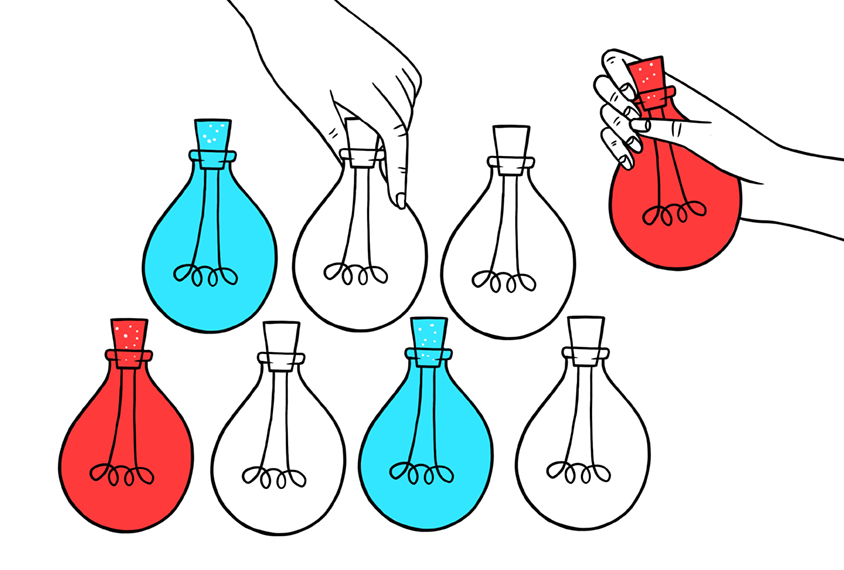In July, psychologist Nichola Raihani tweeted that her paper on social anxiety had been rejected for a null result. In single-sentence review, one reviewer pointed out “the lack of significant findings,” she wrote, and recommended submission to a more specialized journal. “I thought I would tweet it mainly because the reasons given for the rejection seemed to be so out of touch with open science, reproducibility etc.,” Raihani told Spectrum in an email.
Her sentiment clearly resonated with many: As of 1 September, the tweet had received 1.5 million impressions, Raihani says.
Fortunately, some null results — and replications — do make it into press. Two have featured in Spectrum’s coverage over the past two months: One team of researchers found no association between prenatal antipsychotic use and autism, and another reported a failure to replicate their own results on children’s abilities to infer information.
Below are some other important null results and replications of late. If you are enjoying the newsletter, please take a minute to confirm your subscription, if you haven’t already. We’d also love if you could fill out our brief survey on your plans to attend scientific conferences this fall. Thanks, as always, for your feedback, and please continue to send your thoughts, ideas, interesting studies and cat photos to [email protected].
Treatment flop:
Research in cells and mice has previously pointed to a class of proteins, called insulin-like growth factors, as a promising treatment for some autism-linked genetic conditions. In 2020, for example, researchers showed that insulin-like growth factor 2 reduces cognitive impairments, motor difficulties and seizures in a mouse model of Angelman syndrome. But in a new mouse study, the treatment failed: Mice given the proteins had brief changes in motor skills and neural activity, but the effects were short-lived, and the animals’ learning, coordination, social skills, seizures and cognition were unchanged. It’s unclear what the results mean for treatment in people, the authors note; it’s still possible that tweaking the dosing could produce effects.
The results were published in Molecular Autism last week.
Repeat analysis:
Many people with mutations in the gene PTEN have autism, but such mutations are also linked to restricted and repetitive behaviors in non-autistic people. People with PTEN mutations also often have an unusually large head, or macrocephaly. To better understand how the gene influences outcomes, researchers compared three groups of people: those with and without autism who have PTEN mutations, and those with autism and macrocephaly but no PTEN mutations. Initially, non-autistic people with PTEN mutations appeared to have lower levels of certain repetitive behaviors than those in the other two groups, but the differences disappeared after adjusting for age and intelligence quotient.
The findings appeared in the American Journal of Medical Genetics in August.
Oxytocin (again):
The previous edition of this newsletter reported “case closed” on oxytocin during pregnancy, but researchers continue to investigate the hormone’s effects in autistic people as a possible treatment. In a new study, 27 autistic boys and men aged 15 to 33 took oxytocin or a placebo before viewing picture sets in a brain scanner. The images showed neutral versus embarrassing, emotional or physically painful situations. Participants rated the intensity of the pain or emotion for each picture set. The researchers also checked whether the participants had a variant — previously linked to social cognition — in the gene that codes for the oxytocin receptor. Regardless of receptor genotype, though, oxytocin treatment had no effects on the participants’ brain activity, aside from an increase in the amygdala when they viewed images associated with physical pain. The team halted the trial early because of a lack of recruitment.
The findings were published in Scientific Reports in July.
Sex sameness:
Researchers are increasingly probing how autism differs by gender. To better understand executive function — which is often a challenge for autistic people — a team compared autistic men and boys and women and girls with one another and also with their non-autistic counterparts. Sex differences among autistic people were no different from those among non-autistic people, they found: Both non-autistic and autistic women scored higher on measures of verbal learning and memory, cognitive flexibility and other measures of executive function than non-autistic and autistic men did. The study contradicts ideas that autism is in part linked to atypical sex development, the researchers write.
The findings were published in Autism in June.
Et al.:
- In the ongoing vitamin D inquisition, researchers found that a high daily dose confers no neurodevelopmental benefits over a standard one for infants and toddlers, and may even be detrimental.
- In a study of nearly 7 million people in the United Kingdom, researchers confirmed a widely reported increase in autism diagnoses and attribute the 787 percent uptick from 1998 to 2018 largely to changes in how the condition is diagnosed.
- Smoking cigarettes during early or mid-pregnancy doesn’t increase the likelihood of having a child with autism.
- A review of 33 studies on omega-3 fatty acid supplements during pregnancy couldn’t reach any conclusions around the supplements’ effects on autism odds, though it did identify a lack of racial, ethnic and socioeconomic diversity in such studies.
- Autistic and non-autistic children pay equal attention to puppets but not to people, suggesting that puppets may be useful for some therapies.
- Autistic children with low support needs can understand indirect requests — such as, “I see you haven’t signed up for the Null and Noteworthy newsletter yet” — as well as non-autistic children can.
- The evidence thus far does not support the use of augmented reality to help people with autism or intellectual disability gain academic skills, according to a review of eight studies.
- A tiny replication of an even tinier study endorses techniques to help autistic children with food selectivity accept more nonpreferred foods at mealtimes.
- And finally, a commentary in Nature makes a case for shifting the burden of replication from individual labs to coordinated communities.






